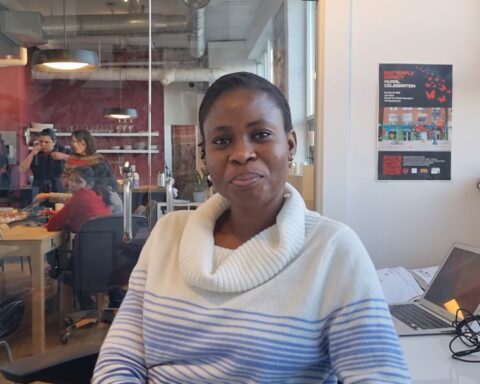While performer and playwright Natasha Martina was researching in a library in Dublin for a play, she came up with the idea to combine her family’s emigrant story and her creative partner Sue Mythen’s knowledge about the Irish famine years of 1840s.
The result: a contemporary theatre production about how the Canadian immigration system has progressed since before its inception in 1867 to present day, which was featured in this year’s Saskatoon Fringe Festival.
Martina and Mythen’s play Displaced tells the story of three immigrant women: Mary, who leaves Ireland during the famine in 1847; Sofia, who flees Germany in 1947; and Dara who escapes an arranged marriage in Afghanistan in 2007.
Displaced tells the story of three immigrant women: Mary, who leaves Ireland during the famine in 1847; Sofia, who flees Germany in 1947; and Dara who escapes an arranged marriage in Afghanistan in 2007.
Growing up as a first generation Canadian, Martina heard stories about her parents starting with nothing, saving every penny to make a life here, and her godparents coming over on a freighter ship with only $9 in their pocket.
She also learned about other families’ immigration stories by volunteering at the Saskatoon Open Door Society, helping newcomers learn English.
“I heard about so many stories from individuals, as well as I interviewed a couple of employees from Open Door, who had experienced similar challenges in their plight to immigrate to Canada,” says Martina, who is also an associate professor in the drama department at the University of Saskatchewan. “I was very humbled by their stories and even more empowered to create and produce Displaced.”
Many women in Canada can relate to the experiences told through the characters in Displaced. Here is a look at just four.
Seeking refuge from persecution
Samra Kanwal is an Ahmadi Muslim from Lahore, Pakistan. She came to Canada in March 2012 to flee persecution from the government.
She was 18 when she moved with her parents, younger sister and brother to Saskatoon, Saskatchewan.
Her uncle and aunt sponsored her family through the Saskatchewan Immigration Nominee Program, which gave them much support in the two years it took for her family to become permanent residents.
“It was a tough time as we had to spend money accordingly and had to be cautious that people around us should not learn about our decision to move to Canada,” explains Kanwal. “Otherwise, we could have faced problems from the extremists who could hit you any time since they have backing of the local authorities.”
Getting a foot in the door
Sarka Kolacna still remembers the exact date she arrived in Canada – Oct. 28, 2006. That’s because it’s a national holiday, similar to Canada Day, in her home country of the Czech Republic.
When she was researching ways to enter Canada, she saw the live-in caregiver program as her only option. She posted an ad on Craigslist and found one family who she worked with for two years before applying for permanent residency.
“I never thought I’d be able to teach English here.”
Since then, she’s started to make use of her formal training as a teacher of English and German. She is teaching English as a Second Language (ESL) for a global relocation company.
“It’s what I was originally trained to do, and I enjoy it very much. I never thought I’d be able to teach English here, and the fact that I’m not a native speaker often excludes me from being a suitable candidate for a job that requires it, but some schools don’t.”
Dealing with the Canadian cold
In 2010, at age 18, Nengi Allison moved from Rivers state in southern Nigeria to Nanaimo, B.C. There, she lived in an apartment with six other Nigerian students. In 2011, she moved to Regina to study environmental studies at the University of Regina.
Allison has no family in Canada and misses home a lot.
She had to get used to an entirely different culture in terms of studying, and the drastic difference in climate – particularly the winter.
“I found the winter affected me psychologically because you have to stay warm at all times and I’m trying to concentrate on what I’m studying,” explains Allison. “All of a sudden I wanted to go back home because where I come from, Nigeria, it’s always hot there.”
Adjusting to work culture
Cecilia Olmos is a sports journalist from Mexico City. Her older brother, who immigrated to Denmark 16 years ago, inspired her to immigrate to Canada.
In 2006, Olmos went to Vancouver as an ESL student. She instantly fell in love with the west coast city.
“I loved its landscapes, nature and vibe. I wanted to stay longer, but I didn’t really know how,” says the 34-year-old.
“The way people negotiate, interact, and communicate with one another was so different from what I’m used to.”
After learning that studying in Canada could help her chances in the immigration process, she booked her flight to Vancouver in December 2008.
First, she completed an ESL program in Vancouver, and then enrolled in a sports journalism program in Toronto where she was the only foreign student.
When Olmos moved back to Vancouver she was fortunate to find a workplace that sponsored her, but she struggled with the work culture.
“Everything from behaviour to customs and habits was very difficult for me to get used to,” she says. “The way people negotiate, interact, and communicate with one another was so different from what I’m used to. And doing all of the above with English as a second language made it double challenging.”
Florence Hwang is a Saskatchewan-based freelance writer. She is a media librarian who loves storytelling. She has written for La Source newspaper, CBC Saskatchewan, Saskatchewan Folklore and South Asian Post.





